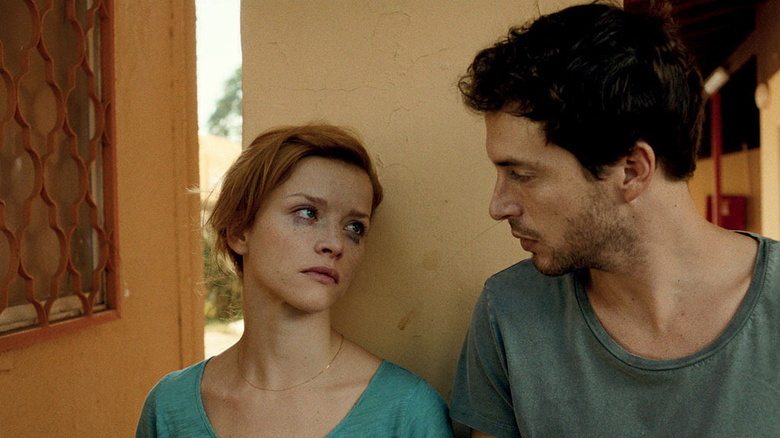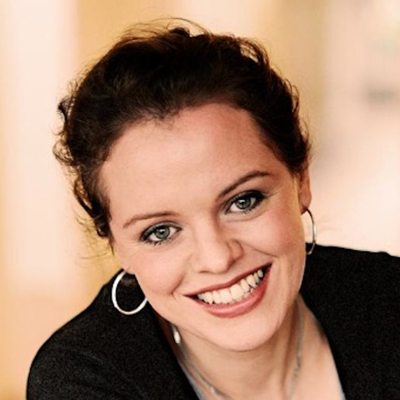

In director Julia von Heinz’s “Hanna’s Journey” Karoline Schuch plays the title character, an arrogant young woman from Berlin who decides to do volunteer service in Israel in order to pump up her resume, because according to her nothing looks better than helping disabled Jews. Once she arrives in Israel, she realizes that she signed up for more than she bargained for and begins to (re)discover the tragic history that links her country to this place. Allowing herself to become lost amidst the chaos, she opens up to the world in unexpected ways, even leading to the possibility of romance.
But fear not, Heinz’s film is not your typical “awful character is changed by good people” film, instead it is a complex portrait of what it’s like to grow up and realize you have no idea what your life is really about. The film is part of the Kino Festival of German Films held in New York City and we had the opportunity to talk to director Heinz about her work.
Can you talk about finding this novel and turning it into a film?
A production company came up to me with the novel and asked if I wanted to adapt it with my husband. I knew Israel, had been there a few times so I liked the story; however we went far from the story, very far, so the book inspired us to make the film. Luckily the author of the novel told us she still recognized the essence of the story and she liked the film. We took the novel’s humor and took that as the starting point for our story.
I wanted to ask about the humor, because while people in America tend to be more politically correct, we see your movie actually asking us to laugh at Holocaust jokes. Why was this the right time to use humor to touch this subject?
No one is touched by those other stories anymore. Young people don’t go see these movies. People aren’t touched by that anymore, yes, they are horrible stories but many have had enough of them. Of course, the Holocaust is very important and we want to make people feel something about it, but we wanted to find another way. People have found the movie funny in America, Germany and in Israel.
Hanna is quite insufferable when the movie begins. Were you at any point concerned that she would alienate audiences?
People really don’t like her and some don’t like the film and that’s OK. But when we were writing it and discussing who would this person be we wanted her to be complex. I don’t even think she’s developed that much when the movie ends, she’s still the same but something happened to her, but she won’t really change.
In the film we see Berlin as a very cold, grey place, while Israel is sunny and gorgeous. Was this intentional? Is this how you perceived these places or is this how the character sees them?
I wanted also a development there, in the beginning Berlin is very cold and Israel is warm, because that’s how it was but towards the end of the film they are blending together, Berlin becomes warm, they meet in the middle. I wanted to point out the similarities between Tel Aviv and Berlin, both cities share the same spirit.

Can you comment on how you use Skype in the film? While not an attractive device, more movies seem to be recurring to the internet to show how characters talk to each other.
This was natural because it’s what we all use. This is how Hanna would communicate, she wouldn’t pick up the phone or write a letter (laughs). But since we were working with the Public Television in Germany, we had to redesign the logos and interface.
How did you cast Karoline?
I saw many young women for this character, many good actresses came to the audition but I knew Karoline from a daily soap. Fifteen years ago there was this soap called “Forbidden Love” and she played a daughter. I liked her very much and I don’t know why when we started working on the film we had a picture of her on the wall. Then she came and she was very, very good. After “Hanna’s Journey” she has done two other big movies and I’m doing my next film with her as well. Although she is 31, which is quite late for an actress, she’s breaking through in cinema and that’s great.
Can you talk about casting Suzanne von Borsody to play the mother?
The movie is a mother-daughter love story and I’d done a family entertainment movie and Suzanne was in the film. I think it’s very brave how she shows herself, she looks much older in my film, she went with no makeup and we shot her in light that didn’t make her look good.
What kind of directions do you give?
I do rehearsals and I listen to them, ask them how they feel and how they would do a scene. I like their opinions, I don’t always take them (laughs) but I want to give them influence and help them to merge with the character. Especially with this film I knew how it would look like, so I had quite clear how they would appear.
The movie has many subplots, how easy was it for you to stick to Hanna’s story?
We have many, many plots. We have activists, the mother, we have live five plots, my cinematographer and I decided that Hanna had to be in every shot to keep it together. And she is. There is not one take where there’s not her arm, her hair...there’s no shots without her, except for impressions of the city for example. This is how we keep it together.
What do you want audiences to take from the film?
In Germany what happened is that people said “oh I have to ask what happened”, I want people to feel there is still a connection between them and the subject. In Germany for example, 20% of the young people think that their parents were in resistance and only 1% think their families chose the Nazi Party. And it’s the other way around! People think wrong because they don’t ask. I wanted to try to move away from misconceptions of history.